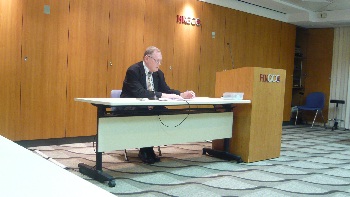Speaker: Russell Pipe, Adviser, Asian Institute of Technology (AIT), Bangkok
The benefits of applying digital technologies to government and business operations are widely recognised in most countries. KM is becoming part of many e-Government initiatives. The five stages of e-Government – from emerging digital services via websites, to enhanced and interactive services, to transactional interactions between citizens and government, to connected governments to serve citizen needs with integrated back office infrastructure, to
transformational government where KM has an important role.
 Russell Pipe, Adviser to the Asian
Russell Pipe, Adviser to the Asian
Institute of Technology, Bangkok
Major attention is being placed on e-Participation for Citizen-Centric e-Government. The focus is to re-build and strengthen relationships between citizens and governments. KM is considered key to sharing knowledge and providing access to knowledge and expertise. Top challenges to the uptake of KM are public awareness, ability to understand and apply KM, and providing strong management support.
The presentation focuses on these issues as well as leadership in planning and management that are keys both to success of e-Government and applying KM. High level leadership and coordination as well as effective work by Chief Information Officers (CIOs) required to achieving success. These remain a
challenge in many countries.
Russell is a consultant to the World Bank Global ICT Division, having worked on e-Government projects in several countries as well as policy, regulation and services trade issues. He was responsible for preparing the E-Government Knowledge Map under a World Bank project in 2006. He served as a member of the steering group for the Thailand National E-Government Assessment Project in 2008-2009. In 2009 he was appointed Advisor to the International Academy of CIO.
Under an International Telecom Union (ITU) programme, he carried out an assessment of e-Government strategy in the Marshall Islands. He directed a project for the Vietnam Bank for Social Policy to design a programme to provide IT operational support and staff training for its extensive micro-finance loan programmes. In 2006 he prepared an ICT assessment of Lao PDR, evaluating progress toward accession to WTO. Under a World Bank project in Cambodia, he provided technical assistance to the Ministry of Posts and Telecom Cambodia
to implement commitments following accession to WTO.
In January 2010 he will be director of an AIT 10-day training course on Strategies for Successful E-Governance.